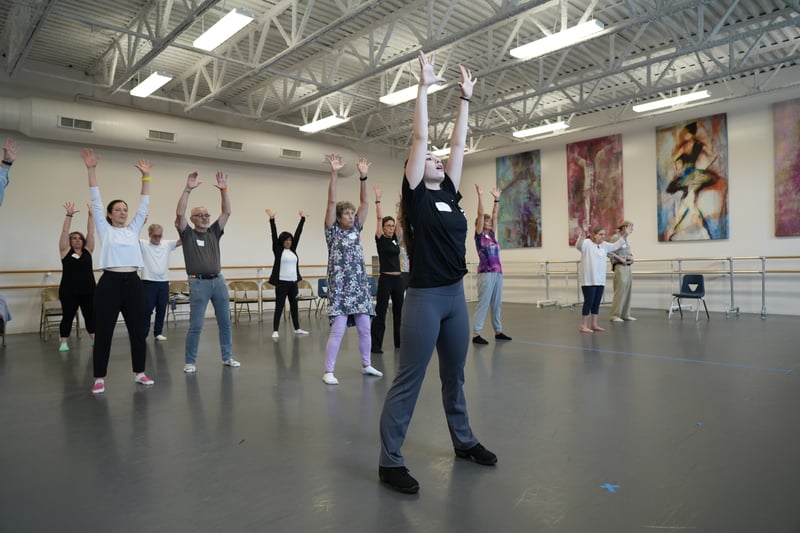Get Healthy!

- Cara Murez
- Posted July 20, 2023
Dancing With Parkinson's: New Program Helps Patients Control Movements
Every week, a group of dancers meets in Chicago. Together, they follow a series of movements under the guidance of an instructor.
They flex, and reach, and point as Carly Liegel, community engagement program coordinator for the Joffrey Ballet, leads them through a series of movements with their arms and then their legs.
But these aren't professionals, and they aren't your average dancers.
Each one has Parkinson's disease, a progressive brain disorder with no known cure that can cause uncontrollable movements and balance issues.
In conjunction with Northwestern Medicine, the Joffrey Ballet started offering "Dancing with Parkinson's" this summer, exploring ballet, jazz, tap and modern dance, as well as a little improvisation, to tunes played live by a pianist.
The five-week program has had a surge of interest, so much so that Northwestern is planning another session.
"We've never had a program that filled up as quickly as this one in the 10 years that I've been here,"said Dr. Danny Bega, movement disorders specialist at Northwestern.
Ginger Hall, who was diagnosed with Parkinson's disease two years ago, takes the classes.
She knows it's important to stay active to manage her symptoms.
"I do believe that the magic bullet for Parkinson's is exercise. Even though you can't gain what you've lost, you can keep Parkinson's at bay,"Hall said in a Northwestern news release. "Post-COVID, this program reminds me of how important community is, so, I'll come back to every class because they're good people and it's fun to be out with a group."
Northwestern has long been interested in dance interventions for Parkinson's patients, Bega said.
When the Joffrey Ballet reached out to offer this collaboration, the doctors were very excited about the opportunity, Bega said.
"The fundamental reason for this is that we want people with Parkinson's to be active,"Bega said. "We're always coaching them to increase their physical activity. We know that the one thing that can slow down disease and empower people to take control over their own condition is physical activity."
As COVID-19 restrictions have eased, it was the right time for this program to get started, said Liegel.
The Joffrey Ballet is interested in offering opportunities for a lot of different ages and to "try to make dance accessible to people in communities in the Chicago city and then suburbs, people who may not have access to it otherwise,"Liegel said.
This includes outreach work with children, but the organization was also interested in working with people over age 50.
"I'm a big believer that dance is for everybody. And it's not just about movement and the physicality of it, but it's about the artistry,"Liegel said. "Sometimes I think people think when they get to a certain age or they haven't had exposure to arts by a certain age that it's lost and they're not able to touch it anymore."
Something else she loves about dance "is that you don't have to look like the person next to you," she said. "You can do what you need to do for yourself and just inviting that expression in rather than finding judgment,"Liegel said.
Dance is a way to get people with Parkinson's engaged and motivated, making it sustainable, Bega said.
Benefits include help with the motor symptoms that are the hallmark of the disease, as well as non-motor symptoms.
Dance can help with physical issues like mobility, balance and coordination, Bega said, as patients work on their footwork and coordinating movements. But it can also make a difference in fatigue, anxiety and cognitive (mental) issues that people with Parkinson's face.
"To have an intervention that can also attack those problems, that can also deal with fatigue and anxiety while helping the motor symptoms is really a particular advantage and one of the reasons that we're interested in these sorts of mind-body activities,"Bega said.
Having to remember different routines and steps uses memory and thinking skills. Partnering with others builds social experiences. There's a camaraderie from being with others who have the same condition, similar to a support group. Simply getting out of the house is a benefit, he added.
The program's popularity may be partly due to recognition of the Joffrey Ballet name. And it might be that dance sounds like fun, like a hobby, rather than exercise. The music itself can also have an impact on people's quality of life, Bega said.
What participants get from this class is "just knowing that anybody can dance no matter what your ability is,"Liegel said.
She appreciates seeing the joy on a dancer's face when they master something new.
"I just love when, even if they mess up, they allow themselves to laugh at themselves and each other in the most lighthearted and fun way,"Liegel said.
Northwestern also has collaborations with the theater improv group Second City for patients with Parkinson's and is developing golf and tennis classes for this patient group, as well.
In this class, space is limited to about 30 participants. Each Parkinson's patient is allowed to bring a caregiver or friend.
"Anything we can do to keep them engaged and active and empowered to take control over the disease, I think is going to be beneficial,"Bega said.
More information
The U.S. National Institute on Aging has more on Parkinson's disease.
SOURCES: Danny Bega, MD, movement disorders specialist, Northwestern Medicine, Chicago; Carly Liegel, community engagement program coordinator, Joffrey Ballet, Chicago; Northwestern Medicine, news release, July 20, 2023

